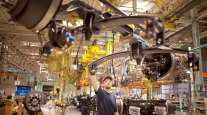Senior Reporter
August Class 8 Orders Extend the Slump

[Stay on top of transportation news: Get TTNews in your inbox.]
North American Class 8 orders in August continued to mimic fleets’ wait-and-see attitude as orders again fell below replacement level and plunged 79% from the all-time record set a year earlier, ACT Research reported.
Preliminary net orders were 10,900 compared with the peak of 53,069 orders a year ago, according to ACT, which cited initial data that truck makers will update soon.
The annual Class 8 replacement level for North America is about 220,000 units, said ACT Vice President Steve Tam, or about 19,000 to 20,000 orders a month — so far this year, no month has come anywhere close to reaching that volume.

Tam
Separately, the annual U.S. replacement level is about 190,000 units, or about 16,000 orders a month — only the first three months of this year have produced orders that barely support the lower U.S. monthly replacement figure.
“Seldom in the span of available history for the Class 8 North American marketplace has there been such a wide gap between indicators that are robust and those that point to weakness,” ACT President Kenny Vieth said. “Monthly data for build and retail sales are close to all-time highs, but these are backward-looking metrics. Forward-looking measures, like net orders and inventories, are telling a different tale, pointing to trouble ahead as we close the books on 2019 and prepare for 2020.”
Class 8 retail sales in 2018 were well above U.S. replacement levels and surged to 250,545. They started to accelerate in May 2017 and have continued, averaging about 23,000 a month so far this year, according to WardsAuto.com.
“That’s exactly the crux of the matter,” said Tam. “We have put too many trucks into the fleet and, in essence, at above-replacement levels.”
“So that drives down the average age of the fleet. Now we are entering that payback period when we under-replace, and let the average age of the fleet come back up, and also let the balance between the amount of work to be done and the number of trucks out there to do it get back into equilibrium. It’s the story of every cycle,” Tam said.
It will play out more fully in 2020, he added.
FTR pegged preliminary net orders at 10,400.
There is a tremendous amount of uncertainty in the economy right now due to tariffs and the trade war with China, said Don Ake, vice president of commercial vehicles, at FTR. “Businesses are holding back on capital investment and our industry is no exception.”

Ake
“If they get a trade deal done [a U.S.-China meeting is scheduled for October], that takes out the uncertainty and things will operate a little more normally within the economic framework,” Ake said.
But if uncertainty continues, it could upset fourth-quarter truck orders, he added, with fleets possibly only placing orders for the first quarter of 2020, rather than placing more orders into second and third quarters at the same time.
According to FTR, fleets right now feel no urgency to start ordering for 2020, as ample build slots will be available and no shortages of components loom to disrupt delivery schedules.
Dealers don’t have to order immediately either, said one dealership executive.
“Large dealers consumed the lion’s share of ‘unsold’ slots in 2018 and 2019. As the market anticipates a substantial correction in Q4 and Q1 2020, there is not good order intake industrywide. Inventories are at all-time highs and dealers can sustain incremental business through inventory, not order outs,” said David Kriete, CEO of Kriete Group.
Kriete’s eight truck dealerships are scattered across Wisconsin and represent Mack Trucks, Volvo Trucks North America, Hino and Fuso.
Meanwhile, in the face of slowing demand and the need to manage its backlog, Navistar Inc., the manufacturing subsidiary of Navistar International Corp., has reduced production by 15% across all its plants compared with its high production rates reached in 2018.
“I’d say we have a very normal backlog in a 165-day range, which is, I think, comparable to where a lot of our competitors are,” Navistar International CEO Troy Clarke said Sept. 4 during an earnings conference call.
“It’s a healthy backlog that allows our order and delivery system to run efficiently without a lot of stranded inventory, and a lot of premium freight and other costs that we might run into,” Clarke said.
Not a lot of Navistar’s current orders are likely to be canceled, although “there are orders that have the potential for re-timing,” he said.


